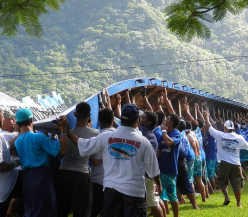Summary of Energy Initiatives in the Territories
- Background Information
Excerpt from:
US Department of Energy: Energy Efficiency and Conservation Block Grant (EECBG) Program
The U.S. Department of Energy’s (U.S. DOE) Energy Efficiency and Conservation Block Grant (EECBG) Program, funded for the first time by the American Recovery and Reinvestment Act (Recovery Act) of 2009, represents a Presidential priority to deploy the cheapest, cleanest and most reliable energy technologies to local governments across the country. It is intended to assist U.S. cities, counties, states, territories, and Indian tribes to develop, promote, implement, and manage energy efficiency and conservation projects and programs designed to:
- Reduce fossil fuel emissions;
- Reduce the total energy use of the eligible entities;
- Improve energy efficiency in the transportation, building, and other appropriate sectors; and
- Create and retain jobs.
Over $2.7 billion was allocated for direct EECBG formula grants to more than 2,300 State, local and tribal governments. Each U.S. territory received a grant of $9.6 million.
Territory of American Samoa
Grant period: 12/28/2009 – 12/27/2012
Total award: $9,593,500
Payments: $604,700
The majority of American Samoa’s EECBG funding is directed toward performing energy efficiency retrofits on government buildings. Because this is a two-step process with energy audits conducted first, progress has been slow and now 14 months into the award period, the retrofit work has not yet begun. For American Samoa, one of the major impediments to progress has been the length of time required to get procurements for contractors released and awards and other agreements signed.
Activity 1:
Energy Efficiency and Conservation Audits ($189,000)
This activity is funding thorough energy audits of approximately 50 government, non-profit and commercial buildings in order to identify the best candidates for retrofits under Activity 2.
Status: The audits are to be completed in three phases; Phase I and 2 audit reports have been received from the contractor.
Activity 2:
Building Retrofits for Energy Efficiency and Conservation ($7,307,369)
This activity implements the recommendations resulting from the building audits in Activity 1. The retrofit of the American Samoa Environmental Protection Agency (ASEPA) building will serve as a benchmark for the remaining retrofits and, when completed, it will be the first LEEDS certified facility in the South Pacific. Since there are several similar buildings in the same vicinity, the methods and lessons learned from this first retrofit will be replicated in the neighboring buildings.
Status: The design work for the ASEPA building has been completed. The Request for Proposal (RFP) for the retrofit work resulted in no acceptable proposals and the RFP is being re-released. RFPs for lighting and other efficiency measures based on the Phase I and 2 audit reports have been written and sent to the procurement department.
Activity 3:
Upgrade the Building Code: Energy Sections ($200,000)
This activity will revise the energy section of the American Samoa Building Code.
Status: The Territory Energy Office (TEO) had planned to contract with the State of Hawaii to acquire the services of a specific state employee with expertise in tropical building codes. After almost a year of effort, the arrangement turned out to be unfeasible. The TEO plans to sign a Memorandum of Agreement (MOA) with Pacific Northwest National Labs to provide energy code development support.
Activity 4:
Energy Distribution: Increase Energy Efficiency ($850,000)
A sub-grant to American Samoa Power Authority (ASPA) will fund the installation of a new 13.2 KV feeder line at the Tafuna Power Plant. The existing feeder for the western part of the island is at 85% capacity, which translates into significant energy losses. By splitting the load, energy savings will be accomplished while increasing reliability.
Status: The agreement with ASPA has been signed and work had begun; however, ASPA discovered that the cable in stock for the feeder line was not manufactured in the US and, therefore, construction is on hold until new cable compliant with the ARRA requirement is received.
Activity 5:
Financial Incentives for Energy Conservation (canceled by awardee)
Activity 6:
Energy Education in American Samoa ($298,500)
Funding is provided to American Samoa Community College (ASCC) to develop a grassroots effort to increase energy literacy among young Samoans. ASCC will promote energy-related careers and three students will be hired part-time to extend energy awareness into schools. The students will make presentations in the classroom targeting 5th, 10th and 11th graders. A supervisor will also be hired to lead and coordinate the efforts.
Status: The agreement with the ASCC has been signed and work has begun to hire the supervisor and the “energy ambassador” students.
Activity 7:
Hybrid Vehicles (canceled by awardee)
Activity 8:
Administration ($748,631)
Funding is provided for project administration and management personnel, supplies and other requirements.
| Attachment | Size |
|---|---|
| 219.26 KB |

